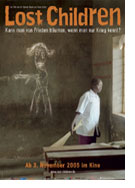

Opening 20 Oct 2005
Directed by:
Ali Samadi Ahadi
Writing credits:
Ali Samadi Ahadi, Oliver Stoltz
The International Catholic Caritas Gulu Center is in Pajule, northern Uganda, where the Ugandan army and rebels have been fighting a civil war for 19 years. One rebel tactic is to kidnap children (20,000 since 1986) and force them to kill, and thus indoctrinate them into the life of a soldier – a life which is difficult to leave. Children cost little money, have no families to support, and are pliable both physically and mentally. Because of the danger involved, documentary filmmakers Oliver Stoltz and Ali Samadi Ahadi were the first white people to visit the Caritas Center in over two years, an oasis without electricity, telephone, or running water.
Here young Ugandan social workers have counselled more than 800 children who escaped from the bush. The children arrive tainted as murderers (80% of them have killed someone else), traumatised as victims, and often wounded as survivors. Four of these children are Francis, 12; Jennifer, 14; Kilama, 13; and Opio, 8. They speak about their experiences: murdering a mother while her young child looked on, guarding captives and letting them go, being raped, fear of HIV infection, etc. In this safe atmosphere, these children slowly become children again, as far as is possible. They draw pictures of their experiences (also a new experience since many of them have never held a pencil). The social workers visit their families in the outlying villages in an attempt to relocate them at home. Often this is impossible, either because the clan members fear renewed kidnappings with consequences for everyone, or they believe that once a person has killed, he will kill again, although sometimes African voodoo celebrations can wipe the child clean. Often the child is afraid to sleep in the village, so each night 40,000 “migrant sleepers” walk into the town to sleep in public buildings, schools, or on the street. Anyone who sees Kilama’s joy when he receives “his” designated bed – a mat on the floor surrounded by 30 other mats – will rethink personal priorities. The Caritas Gulu in Uganda is run by Ugandans, proof that Africans can help themselves; they work in the name and spirit of Christianity. At the same time, war lords such as Joseph Kony and his Lord’s Resistance Army (LRA) say, “God is with us.” The film directors are no strangers to war. Stoltz, born 1969 in Bonn, lived in Namibia during the civil war there. Ahjadi was born 1972 in Iran and trained to be a soldier during the Iran-Iraq war. At age 12 he fled Iran and arrived alone in Germany, where he got his Abitur in Hannover. (Becky Tan)